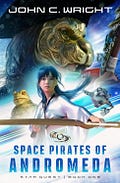Review: Space Pirates of Andromeda by John C. Wright
Silliness with a grander scale and deeper meaning
It's not often you get to read a real homage, one in which the writer loves the source material and extends it. Here, John C. Wright asks "what if the Star Wars sequels were good?" Space Pirates of Andromeda gives us a very satisfying answer.
The Story
Athos Lone is the son of a pair of resistance fighters (one royal, the other a scalawag) who joined a wandering mystic to help overthrow an evil, interstellar empire. Okay, you got it. Except this couple had more kids than just the one.
To avenge his brother’s murder, Athos joined the government force tasked with hunting space pirates. We join him on the job as he breaks into a ship, The Devil’s Delight, with the aid of his ultra-tech space-cloak, his myth-tech lion's mask, and his courageous, heroic nature.
Wright plays his usual trick of packing an epic trilogy's worth of detail into the backstory, of which very little appears on the page. There was a robot in a top hat and a winged pirate queen, but we don't get to hang out with them because we're mostly on that ship with Athos.
To be fair, Wright dumps so much punishment on his protagonist that we spend most of our mental energy wondering how the boy's going make it out of this one. Athos escapes one deadly challenge by diving into another, solving past mysteries and uncovering larger conspiracies as he goes, sometimes with supernatural aid.
The Characters
A little princess escaped her home planet just after the Empire killed its sun. She spent a while in suspended animation before growing up into an astral-projecting temple maiden (not a Star Maiden because technically she hasn't graduated yet). She's searching for the lost founder of her order, the hero of the late war, Jaywind Starquest. Yes, you're still with me.
We also get flashbacks from the rebellion from the point of view of a Centurion of the Deathguards, who wonders if he might be one of the baddies. I assume he'll have a bigger role to play in later books.
Other characters include Liska, of the fox-like Vulpinae, a Batrachian named Groac Wroc Yehomelek, and Tisquantum the Neanderthal. This is Wright's boys-own-adventure style: silliness is on such a tremendous scale that it becomes grand.
The World
Alright, I'll start a fight with the internet: Wright's galaxy is better than Lucas's. Wright is, after all, standing on the shoulders of Star Wars, so it's understandable that he reaches farther. For example, his evil Empire has a definite ideology, and so does the resistance (I'd say it's "programming" versus "free will," and I'm willing to debate it). The magic and technology have limits that give the characters interesting problems to solve while the cultures and societies they hail from have depth. Even the ruins of a vanished civilization display an artistic style that shows us what they thought of themselves.
I have to admit, I loved the little asides about why robots are all built with hands and supertech guns shoot balls of plasma rather than bullets. Those are some sweet justifications. I won't spoil them here.
Politics
If this book were published by the traditional presses, it wouldn't be. The races that populate the Andromeda galaxy include anthropomorphic animal-people such as the Vulpinae (“Foxes”) and Batrachians (Frogs), as well as Nemean lion-men, Neanderthals, long-nosed Noachians, and the Sinanthropes, who are Asians. Myself, I think they're all descendants of settlers from Earth, with varying amounts of genetic engineering, but can you imagine what Mary Robinette Kowal would say? If Wright knows, he writes as if he doesn’t care. There’s an innocent boyishness to his galaxy of colorful creatures and things that go boom, all of it shining with the light of their author’s convictions.
John C. Wright is Catholic. Good comes from God, and evil is what opposes Him. There is no Church of Rome in Andromeda, but various societies there seem to have gotten close. The Empire was a technocracy that punished by death anyone who held "extravagant, unscientific, immoderate, or nonconformist beliefs, opinions, speculations, or fancies." It's not hard to draw real-world parallels.
Aside from that one speech quoted above, the bad guys’ philosophy doesn’t get much airtime. Most of the pirates just want loot, and the Deathguard is just following orders. Even when we're in the heads of the good guys, we don't ponder why they're doing the right thing because the right thing is obvious. The closest I can come to finding a political screed in this book is: "I am not protecting you because I am programmed to do it. I am doing it because it is right and good." I agree.
Content Warning
There's nothing really vile or disturbing in this book. The violence is on the level of Star Wars, meaning bad guys sometimes get blown up. Sex is confined to Athos thinking that this one girl is very pretty.
Who is it for?
If you loved Star Wars as a kid, thought the prequels were dumb, and didn't even bother with the sequels, then you're me. This book was for me. If you were angry about the sequels, this book is probably for you too. Otherwise, if you like Saturday morning cartoons about good guys defeating bad guys, with enough classical and technological in-jokes to make you feel clever, then you're probably me again. This book is great.
Why buy it?
You should buy several! Give them to your friends. Throw them at passers-by. Flood John C. Wright with money so he can quit his day job and spend all his time writing more boys-own-adventures with brain and heart. We have so few books like this one.



